江苏省2020年高考英语听力模拟试题12及参考答案
- 格式:doc
- 大小:30.00 KB
- 文档页数:3
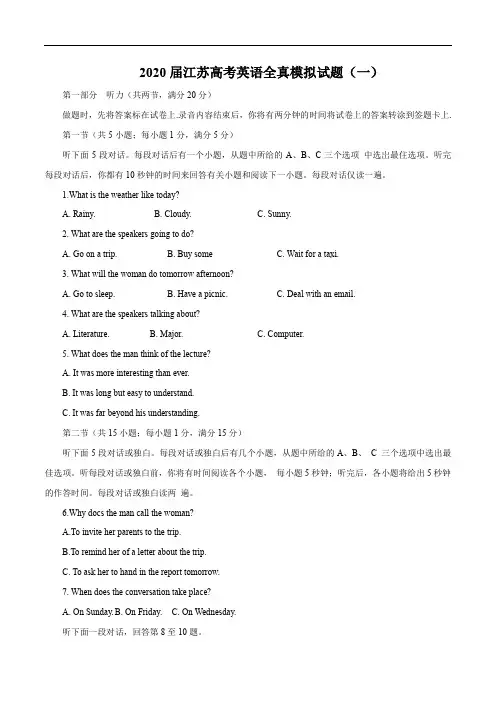
2020届江苏高考英语全真模拟试题(一)第一部分听力(共两节,满分20分)做题时,先将答案标在试卷上.录音内容结束后,你将有两分钟的时间将试卷上的答案转涂到签题卡上.第一节(共5小题;每小题1分,满分5分)听下面5段对话。
每段对话后有一个小题,从题中所给的A、B、C三个选项中选岀最住选项。
听完每段对话后,你都有10秒钟的时间来回答有关小题和阅读下一小题。
每段对话仅读一遍。
1.What is the weather like today?A. Rainy.B. Cloudy.C. Sunny.2. What are the speakers going to do?A. Go on a trip.B. Buy someC. Wait for a taxi.3. What will the woman do tomorrow afternoon?A. Go to sleep.B. Have a picnic.C. Deal with an email.4. What are the speakers talking about?A. Literature.B. Major.C. Computer.5. What does the man think of the lecture?A. It was more interesting than ever.B. It was long but easy to understand.C. It was far beyond his understanding.第二节(共15小题;每小题1分,满分15分)听下面5段对话或独白。
每段对话或独白后有几个小题,从题中所给的A、B、 C 三个选项中选出最佳选项。
听每段对话或独白前,你将有时间阅读各个小题,每小题5秒钟;听完后,各小题将给出5秒钟的作答时间。
每段对话或独白读两遍。
6.Why docs the man call the woman?A.To invite her parents to the trip.B.To remind her of a letter about the trip.C. To ask her to hand in the report tomorrow.7. When does the conversation take place?A. On Sunday.B. On Friday.C. On Wednesday.听下面一段对话,回答第8至10题。
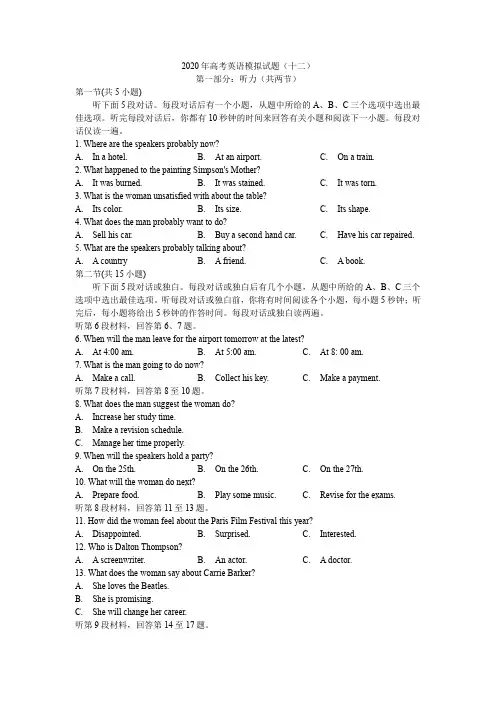
2020年高考英语模拟试题(十二)第一部分:听力(共两节)第一节(共5小题)听下面5段对话。
每段对话后有一个小题,从题中所给的A、B、C三个选项中选出最佳选项。
听完每段对话后,你都有10秒钟的时间来回答有关小题和阅读下一小题。
每段对话仅读一遍。
1. Where are the speakers probably now?A.In a hotel.B.At an airport.C.On a train.2. What happened to the painting Simpson's Mother?A.It was burned.B.It was stained.C.It was torn.3. What is the woman unsatisfied with about the table?A.Its color.B.Its size.C.Its shape.4. What does the man probably want to do?A.Sell his car.B.Buy a second-hand car.C.Have his car repaired.5. What are the speakers probably talking about?A. A countryB. A friend.C. A book.第二节(共15小题)听下面5段对话或独白。
每段对话或独白后有几个小题,从题中所给的A、B、C三个选项中选出最佳选项。
听每段对话或独白前,你将有时间阅读各个小题,每小题5秒钟;听完后,每小题将给出5秒钟的作答时间。
每段对话或独白读两遍。
听第6段材料,回答第6、7题。
6. When will the man leave for the airport tomorrow at the latest?A.At 4:00 am.B.At 5:00 am.C.At 8: 00 am.7. What is the man going to do now?A.Make a call.B.Collect his key.C.Make a payment.听第7段材料,回答第8至10题。
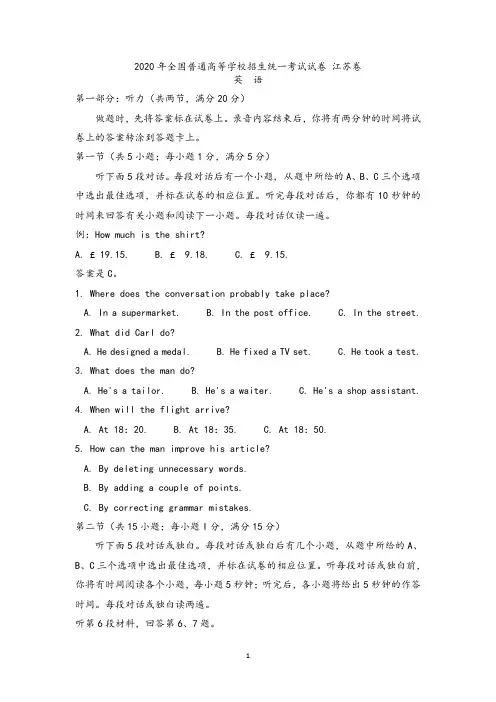
2020年全国普通高等学校招生统一考试试卷江苏卷英语第一部分:听力(共两节,满分20分)做题时,先将答案标在试卷上。
录音内容结束后,你将有两分钟的时间将试卷上的答案转涂到答题卡上。
第一节(共5小题;每小题1分,满分5分)听下面5段对话。
每段对话后有一个小题, 从题中所给的A、B、C三个选项中选出最佳选项,并标在试卷的相应位置。
听完每段对话后,你都有10秒钟的时间来回答有关小题和阅读下一小题。
每段对话仅读一遍。
例:How much is the shirt?A. £19.15.B. £ 9.18.C. £ 9.15.答案是C。
1. Where does the conversation probably take place?A. In a supermarket.B. In the post office.C. In the street.2. What did Carl do?A. He designed a medal.B. He fixed a TV set.C. He took a test.3. What does the man do?A. He's a tailor.B. He's a waiter.C. He's a shop assistant.4. When will the flight arrive?A. At 18:20.B. At 18:35.C. At 18:50.5. How can the man improve his article?A. By deleting unnecessary words.B. By adding a couple of points.C. By correcting grammar mistakes.第二节(共15小题;每小题I分,满分15分)听下面5段对话或独白。
每段对话或独白后有几个小题,从题中所给的A、B、C三个选项中选出最佳选项,并标在试卷的相应位置。
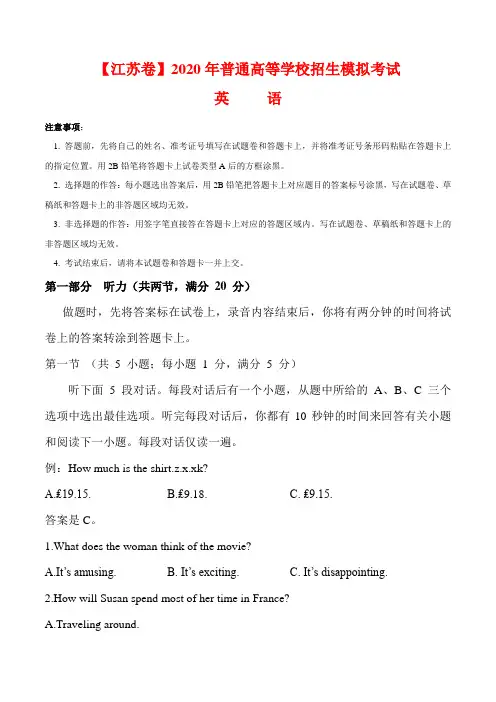
【江苏卷】2020年普通高等学校招生模拟考试英语注意事项:1. 答题前,先将自己的姓名、准考证号填写在试题卷和答题卡上,并将准考证号条形码粘贴在答题卡上的指定位置。
用2B铅笔将答题卡上试卷类型A后的方框涂黑。
2. 选择题的作答:每小题选出答案后,用2B铅笔把答题卡上对应题目的答案标号涂黑,写在试题卷、草稿纸和答题卡上的非答题区域均无效。
3. 非选择题的作答:用签字笔直接答在答题卡上对应的答题区域内。
写在试题卷、草稿纸和答题卡上的非答题区域均无效。
4. 考试结束后,请将本试题卷和答题卡一并上交。
第一部分听力(共两节,满分20 分)做题时,先将答案标在试卷上,录音内容结束后,你将有两分钟的时间将试卷上的答案转涂到答题卡上。
第一节(共5 小题;每小题1 分,满分5 分)听下面 5 段对话。
每段对话后有一个小题,从题中所给的A、B、C 三个选项中选出最佳选项。
听完每段对话后,你都有10秒钟的时间来回答有关小题和阅读下一小题。
每段对话仅读一遍。
例:How much is the shirt.z.x.xk?A.₤19.15.B.₤9.18.C. ₤9.15.答案是C。
1.What does the woman think of the movie?A.It’s amusing.B. It’s exciting.C. It’s disappointing.2.How will Susan spend most of her time in France?A.Traveling around.B.Studying at a school.C.Looking after her aunt.3.What are the speakers talking about?A.Going out.B.Ordering drinks.C.Preparing for a party.4.Where are the speakers?A.In a classroom.B.In a library.C.In a bookstore.5.What is the man going to do?A.Go on the Internet.B.Make a phone call.C.Take a train trip.第二节(共15小题;每小题1分,满分15分)听下面5段对话或独白。
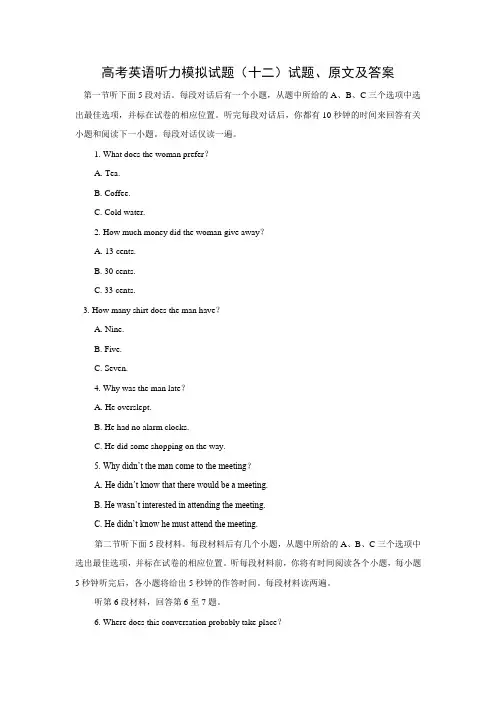
高考英语听力模拟试题(十二)试题、原文及答案第一节听下面5段对话。
每段对话后有一个小题,从题中所给的A、B、C三个选项中选出最佳选项,并标在试卷的相应位置。
听完每段对话后,你都有10秒钟的时间来回答有关小题和阅读下一小题。
每段对话仅读一遍。
1. What does the woman prefer?A. Tea.B. Coffee.C. Cold water.2. How much money did the woman give away?A. 13 cents.B. 30 cents.C. 33 cents.3. How many shirt does the man have?A. Nine.B. Five.C. Seven.4. Why was the man late?A. He overslept.B. He had no alarm clocks.C. He did some shopping on the way.5. Why didn’t the man come to the meeting?A. He didn’t know that there would be a meeting.B. He wasn’t interested in attending the meeting.C. He didn’t know he must attend the meeting.第二节听下面5段材料。
每段材料后有几个小题,从题中所给的A、B、C三个选项中选出最佳选项,并标在试卷的相应位置。
听每段材料前,你将有时间阅读各个小题,每小题5秒钟听完后,各小题将给出5秒钟的作答时间。
每段材料读两遍。
听第6段材料,回答第6至7题。
6. Where does this conversation probably take place?A. At a hotel.B. On an island.C. In a travel office.7. What is the man doing?A. Planning a tour.B. Looking for a hotel.C. Trying to find a book.听第7段材料,回答第8至9题。
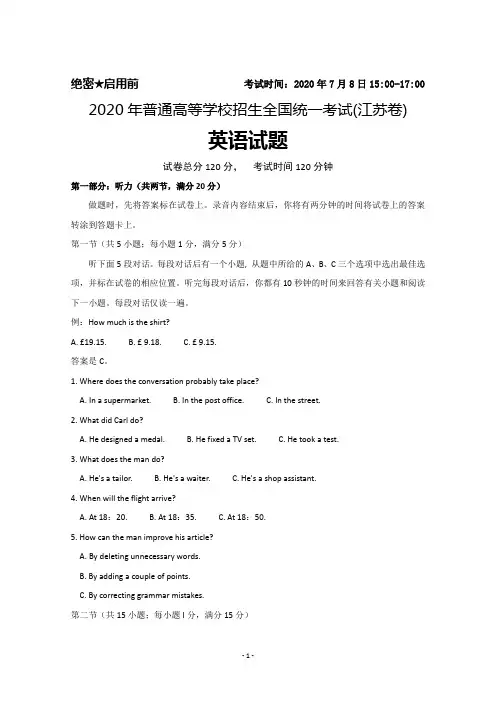
绝密★启用前考试时间:2020年7月8日15:00-17:00 2020年普通高等学校招生全国统一考试(江苏卷)英语试题试卷总分120分,考试时间120分钟第一部分:听力(共两节,满分20分)做题时,先将答案标在试卷上。
录音内容结束后,你将有两分钟的时间将试卷上的答案转涂到答题卡上。
第一节(共5小题;每小题1分,满分5分)听下面5段对话。
每段对话后有一个小题, 从题中所给的A、B、C三个选项中选出最佳选项,并标在试卷的相应位置。
听完每段对话后,你都有10秒钟的时间来回答有关小题和阅读下一小题。
每段对话仅读一遍。
例:How much is the shirt?A. £19.15.B. £ 9.18.C. £ 9.15.答案是C。
1. Where does the conversation probably take place?A. In a supermarket.B. In the post office.C. In the street.2. What did Carl do?A. He designed a medal.B. He fixed a TV set.C. He took a test.3. What does the man do?A. He's a tailor.B. He's a waiter.C. He's a shop assistant.4. When will the flight arrive?A. At 18:20.B. At 18:35.C. At 18:50.5. How can the man improve his article?A. By deleting unnecessary words.B. By adding a couple of points.C. By correcting grammar mistakes.第二节(共15小题;每小题I分,满分15分)听下面5段对话或独白。
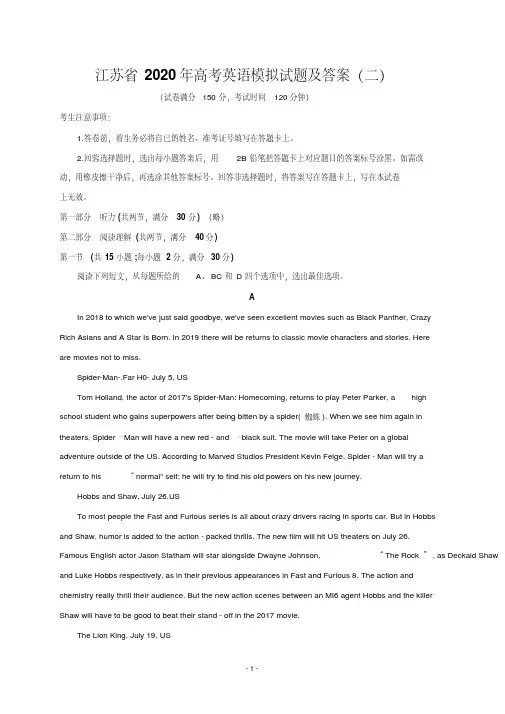
江苏省2020年高考英语模拟试题及答案(二)(试卷满分150分,考试时间120分钟)考生注意事项:1.答卷前,着生务必将自已的姓名、准考证号填写在答題卡上。
2.回蓉选择题时,选出每小题答案后,用2B铅笔把答題卡上对应题目的答案标号涂黑。
如需改动,用橡皮擦干净后,再选涂其他答案标号。
回答非选择题时,将答案写在答题卡上,写在本试卷上无效。
第一部分听力(共两节,满分30分) (略)第二部分阅读理解(共两节,满分40分)第一节(共15小题;每小题2分,满分30分)阅读下列短文,从每题所给的A、BC和D四个选项中,选出最佳选项。
AIn 2018 to which we've just said goodbye, we've seen excellent movies such as Black Panther, CrazyRich Asians and A Star Is Born. In 2019 there will be returns to classic movie characters and stories. Hereare movies not to miss.Spider-Man-.Far H0- July 5, USTom Holland, the actor of 2017's Spider-Man: Homecoming, returns to play Peter Parker, a highschool student who gains superpowers after being bitten by a spider(蜘蛛). When we see him again intheaters, Spider – Man will have a new red - and – black suit. The movie will take Peter on a globaladventure outside of the US. According to Marved Studios President Kevin Feige, Spider - Man will try areturn to his “normal" self; he will try to find his old powers on his new journey.Hobbs and Shaw, July 26,USTo most people the Fast and Furious series is all about crazy drivers racing in sports car. But in Hobbsand Shaw, humor is added to the action - packed thrills. The new film will hit US theaters on July 26.Famous English actor Jason Statham will star alongside Dwayne Johnson, “The Rock”, as Deckaid Shaw and Luke Hobbs respectively, as in their previous appearances in Fast and Furious 8. The action andchemistry really thrill their audience. But the new action scenes between an MI6 agent Hobbs and the killerShaw will have to be good to beat their stand - off in the 2017 movie.The Lion King, July 19, USThis is a brand - new version of the classic children’s film. The story of wide- eyed young lion Simbastill remains in hearts of world audiences even after 25 years. In this re-telling, Simba again begins thedifficult journey to become the King of the Pride Lands,a vast African prairie(大草原).The favorite part ofthe story for many has always been the friendship between Simba, Timon and Punibaa. The last twosacrifice all they have to help Simba to become the king. How will the new movie re-imagine their famousrelationship?1. Which movie will probably be most popular among children?A. Spider - Man: Far From Home.B. Hobbs and Shaw.C. Fast and Furious 8.D. The Lion King.2. What do the three movies have in common?A. The heroes have appeared in previous movies.B. They have the complex plot and humor style.C. They will be on in theaters in July worldwide.D. Famous actors and actresses act in the movies.3. What’s the writing purpose of the text?A. To ask for movie reviews.B. To make comments on the movies.C. To encourage readers to watch filmsD. To instruct readers to know styles of movie.BA simple project to help a family in need stopped Luke Mickelson in his tracks. In 2012, he and hisfamily were inspired to build and donate a bunk bed, one bed on top of the other, after learning there werelocal children who slept on the floor. Shocked to discover how widespread this need was in his community,Mickelson founded Sleep in Heavenly Peace, a nonprofit that builds and delivers beds to children in need.Born and raised in Idaho, Mickelson, now 41, had a thriving career. He coached his kids’and fished in the nearby river. But when he met children who were sleeping on the floor, his peaceful lifechanged course.Using safety guidelines and his daughter’s bunk bed as a model, Mickelson started buying wood and supplies to build beds with his own money. He recruited friends and family members to help around theholiday. As word spread, interest and involvement from his and other communities flooded—along withThe nextMickelson’s bunk bed output. “That first project, we built 11 bunk beds in my garage,” he sa year, we did 15. Then it doubled every year. In 2017, we built 612 bunk beds.”With the motto “No kid sleeps on the floor in our town”, the nonprofit and its more than 65 branches have built and delivered more than 1,500 free beds to children across America. But along with the rapidgrowth, Mickelson was faced with a tough choice: advancing his career or his nonprofit. He chose the latterand went from making “great money to zero money”. He’s never looked back. “I found that the nee isn’t financial,” he said. “The need I have is seeing the joy on kids’ faces, knowing that I can difference.”4. Why did Mickelson set up Sleep in Heavenly Peace?A. To help the poor children.B. To make a big fortune.C. To inspire his community.D. To get more donations.5. What do we know about Luke Mickelson?A. He had his own fish farm.B. He changed his career from time to time.C. He used to sleep on the floor when he was a kid.D. He originally had a relaxing and pleasant life.6. How did other peop le react to Mickelson’s project?A. They showed little interest in it.B. They were supportive and involved in it.C. They were doubtful about the safety of the bunk bed.D. They volunteered to buy beds with their own money.to the nonprofit?7. What is Mickelson’s attitudeA. AmbiguousB. Defensive.C. Cautious.D. Positive.CLearning how to face silence in conversation is an important skill especially when working acrosscultures.In international negotiations, experienced negotiator (谈判者) stay silent and impassive on purposebecause that will make others feel uncomfortable and possibly make compromises without having to doanything. Americans especially can’t stand silence, so they often are the first to break the silence and sometimes might be at a disadvantage in negotiations.So what’s the best response? Set your jaw and wait it out. Don’t offer a compromise just becauseare not speaking. If you have to say something, ask a direct question, such as “What’s your in to that offer?” Once a silence is getting into 45 seconds you could say, “Let’s come back to t and go on with the next part of our negotiation.”In presentations, silence can be far more effective than dramatic passion (热情). Before starting, lookat the audience and be silent for a moment because that says, “I’m in control. I know what I’m confident.”A classic example was when Apple co-founder Steve Jobs launched the first iPhone. He introduceds. Because silence makes us nervous, our naturalwith many pauses so that you didn’t miss his key pointreaction is that we’d better pay attention, there’s something going on here.Equally, when giving a speech to staff or trainees, pauses count-especially if there are negatives. If youspoon feeding. Give people a moment of silence to get beyond the emotional responsekeep talking you’reand to start thinking consciously and processing.Silence can be an inward-focused thoughtful activity or an outward stillness where you give yourselfthe time to watch and think and listen to the world around you. Having observed the use of silence inFinland and also among the Blackfeet Nation, a North American Indian tribe in northern Montana in the US,we can see benefits far beyond wheeling and dealing.Silence can be a very powerful point for understanding ourselves, understanding others, fordeveloping better common understanding and more productive outcomes and that applies to business,politics, education, law, medicine, every area of human life.8. What is most likely to be Americans idea?A. Speaking less gives the upper handB. The shorter talking gaps are, the better.C. A silent man is the best one to listen toD. Speak out what you have in your mind.9. What is the purpose of the example of Steve Jobs?A. To show the wisdom of Steve Jobs.B. To explain silence can be more effective.C. To introduce how to make a presentation.D. To prove silence can ease one’s nervousness.10. What is the meaning of the underlined words “spoon feeding” in Paragraph 6?A. Supporting some person with any selfless help.B. Feeding somebody patiently with a small spoon.C. Giving others some new ideas to think over carefully.D. Using a way that discourages independent thought.11. What is the main idea of the passage?A. Silence is the best defense.B. Silence in negotiations is of great help.C. Learning the skills about silence is important.D. Silence has different meanings in difficult culture.DBritish people work some of the longest hours in Europe, but are among the least productive. Nowsome companies are shortening the working week to increase efficiency, health and happiness.Rich Leigh has introduced a four-day week at his PR company. In fact, his entire company has Fridayoff, because his firm has adopted a four-day week. It is one of a handful of UK businesses that now operatelike this: staff still get paid their previous five-day salary, but they work a day less. The company found thatthey achieved just as much—and there were even sighs of growth. “The key to the scheme’s success, Leigh says, “is how happy our employees now are.”The average British worker takes only a 34 minute lunch break and works 10 hours overtime eachweek (more often than not this is unpaid). Yet UK productivity falls seriously behind their Europeanneighbors, who tend to work fewer hours.British working practices have caused loss and damage to the nation’s health and happiness. Mo than half a million workers in the UK were signed off with work-related stress or anxiety last year.Moreover, the work landscape itself is changing. Automation and AI will have a significant impact on thelabor market, where unsteady work becomes more common.Britain is the only EU member that allows workers to ignore the EU working time limit and worklonger ho urs. For campaigners, now is the time for a change. O’Grady, an advocate, argues that where businesses have increased their profits as a result of automation, success should be shared with workers inits from new technology, not allowing those at thethe form of reduced hours. “It’s time to share the beneftop to grab them for themselves.” she says.12. We can learn from the passage that ________.A. British people are the least productive in the worldB. Most companies in Britain have conducted a four-day weekC. PR company has witnessed a rise in employees’ happinessD. British people work longer and get more payment than other countries13. Which is the proper description of British working practices?A. The working time of British workers is within the EU limit.B. In terms of productivity, Britain is beaten by the United States.C. Profits gained from new technology are on the decrease.D. Automation and AI are likely to cause an instable work market.14. Which can be inferred from O’Grady’ s words in thelast paragraph?A. It’s time for employers to share the increased profits created by automation.B. Workers should benefit from automation in the form of less working hours.C. New technology should belong to both businesses and workers.D. Businesses can’t make more profits without new technology.15. What is the author’s purpose of writing the passage?-day working week.A. To introduce some British firms’ switch to a fourB. To explain the reasons why British workers suffer stress and anxiety.C. To appeal for more reasonable working conditions.D. To present the current productivity problem in Britain.第二节(共5小题;每小题2分,满分10分)根据短文内容,从短文后的选项中选出能填入空白处的最佳选项。
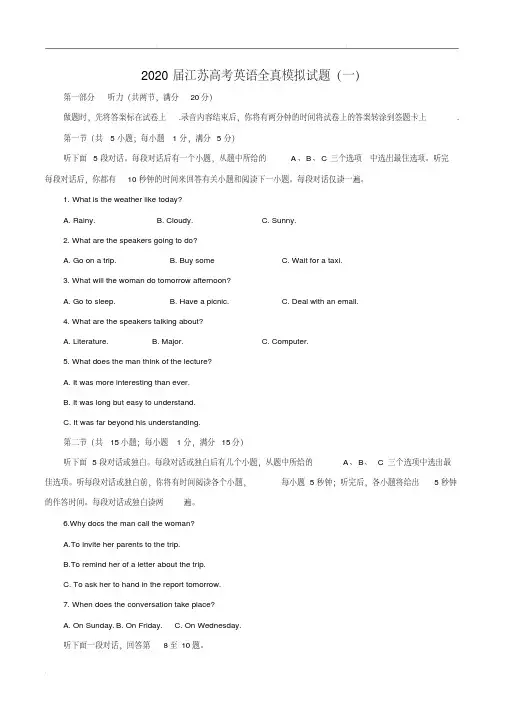
2020届江苏高考英语全真模拟试题(一)第一部分听力(共两节,满分20分)做题时,先将答案标在试卷上.录音内容结束后,你将有两分钟的时间将试卷上的答案转涂到签题卡上.第一节(共5小题;每小题1分,满分5分)听下面5段对话。
每段对话后有一个小题,从题中所给的A、B、C三个选项中选岀最住选项。
听完每段对话后,你都有10秒钟的时间来回答有关小题和阅读下一小题。
每段对话仅读一遍。
1.What is the weather like today?A. Rainy.B. Cloudy.C. Sunny.2. What are the speakers going to do?A. Go on a trip.B. Buy someC. Wait for a taxi.3. What will the woman do tomorrow afternoon?A. Go to sleep.B. Have a picnic.C. Deal with an email.4. What are the speakers talking about?A. Literature.B. Major.C. Computer.5. What does the man think of the lecture?A. It was more interesting than ever.B. It was long but easy to understand.C. It was far beyond his understanding.第二节(共15小题;每小题1分,满分15分)听下面5段对话或独白。
每段对话或独白后有几个小题,从题中所给的A、B、 C 三个选项中选出最佳选项。
听每段对话或独白前,你将有时间阅读各个小题,每小题5秒钟;听完后,各小题将给出5秒钟的作答时间。
每段对话或独白读两遍。
6.Why docs the man call the woman?A.To invite her parents to the trip.B.To remind her of a letter about the trip.C. To ask her to hand in the report tomorrow.7. When does the conversation take place?A. On Sunday.B. On Friday.C. On Wednesday.听下面一段对话,回答第8至10题。
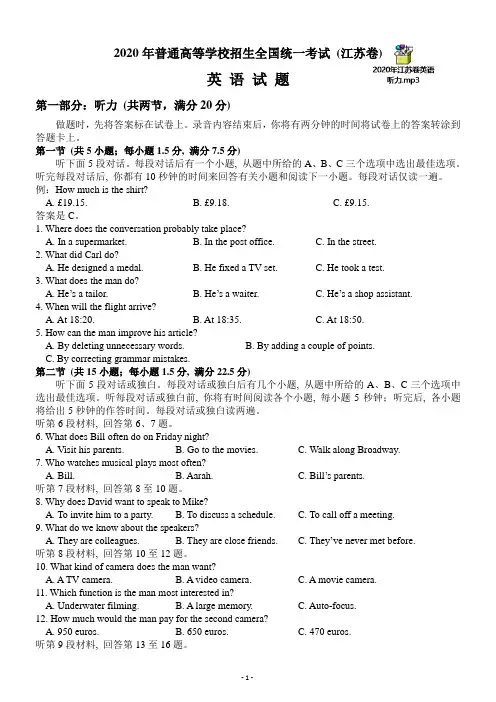
2020年普通高等学校招生全国统一考试(江苏卷)英语试题第一部分:听力(共两节,满分20分)做题时,先将答案标在试卷上。
录音内容结束后,你将有两分钟的时间将试卷上的答案转涂到答题卡上。
第一节(共5小题;每小题1.5分, 满分7.5分)听下面5段对话。
每段对话后有一个小题, 从题中所给的A、B、C三个选项中选出最佳选项。
听完每段对话后, 你都有10秒钟的时间来回答有关小题和阅读下一小题。
每段对话仅读一遍。
例:How much is the shirt?A. £19.15.B. £9.18.C. £9.15.答案是C。
1. Where does the conversation probably take place?A. In a supermarket.B. In the post office.C. In the street.2. What did Carl do?A. He designed a medal.B. He fixed a TV set.C. He took a test.3. What does the man do?A. He’s a tailor.B. He’s a waiter.C. He’s a shop assistant.4. When will the flight arrive?A. At 18:20.B. At 18:35.C. At 18:50.5. How can the man improve his article?A. By deleting unnecessary words.B. By adding a couple of points.C. By correcting grammar mistakes.第二节(共15小题;每小题1.5分, 满分22.5分)听下面5段对话或独白。
每段对话或独白后有几个小题, 从题中所给的A、B、C三个选项中选出最佳选项。
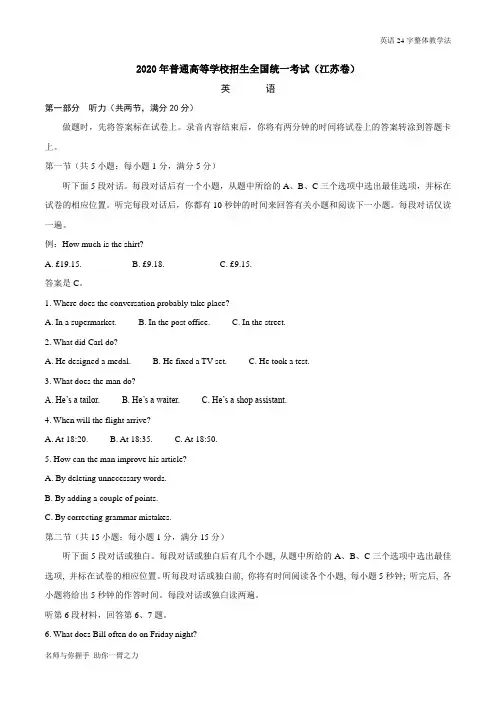
2020年普通高等学校招生全国统一考试(江苏卷)英语第一部分听力(共两节,满分20分)做题时,先将答案标在试卷上。
录音内容结束后,你将有两分钟的时间将试卷上的答案转涂到答题卡上。
第一节(共5小题;每小题1分,满分5分)听下面5段对话。
每段对话后有一个小题,从题中所给的A、B、C三个选项中选出最佳选项,并标在试卷的相应位置。
听完每段对话后,你都有10秒钟的时间来回答有关小题和阅读下一小题。
每段对话仅读一遍。
例:How much is the shirt?A. £19.15.B. £9.18.C. £9.15.答案是C。
1. Where does the conversation probably take place?A. In a supermarket.B. In the post office.C. In the street.2. What did Carl do?A. He designed a medal.B. He fixed a TV set.C. He took a test.3. What does the man do?A. He’s a tailor.B. He’s a waiter.C. He’s a shop assistant.4. When will the flight arrive?A. At 18:20.B. At 18:35.C. At 18:50.5. How can the man improve his article?A. By deleting unnecessary words.B. By adding a couple of points.C. By correcting grammar mistakes.第二节(共15小题;每小题1分,满分15分)听下面5段对话或独白。
每段对话或独白后有几个小题, 从题中所给的A、B、C三个选项中选出最佳选项, 并标在试卷的相应位置。
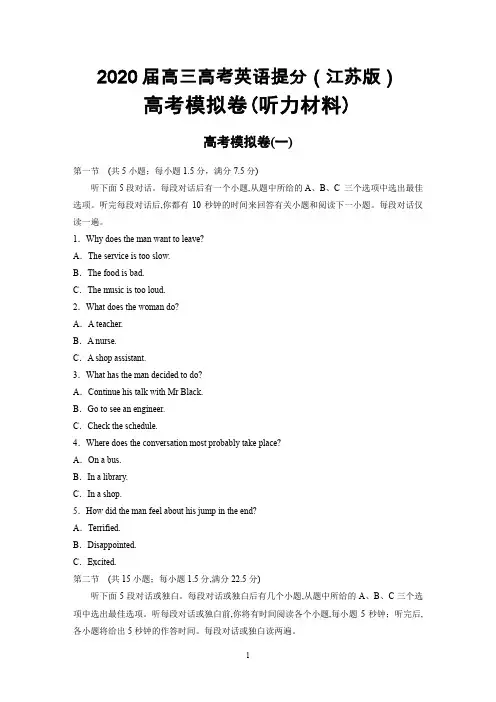
2020届高三高考英语提分(江苏版)高考模拟卷(听力材料)高考模拟卷(一)第一节(共5小题;每小题1.5分,满分7.5分)听下面5段对话。
每段对话后有一个小题,从题中所给的A、B、C 三个选项中选出最佳选项。
听完每段对话后,你都有10秒钟的时间来回答有关小题和阅读下一小题。
每段对话仅读一遍。
1.Why does the man want to leave?A.The service is too slow.B.The food is bad.C.The music is too loud.2.What does the woman do?A.A teacher.B.A nurse.C.A shop assistant.3.What has the man decided to do?A.Continue his talk with Mr Black.B.Go to see an engineer.C.Check the schedule.4.Where does the conversation most probably take place?A.On a bus.B.In a library.C.In a shop.5.How did the man feel about his jump in the end?A.Terrified.B.Disappointed.C.Excited.第二节(共15小题;每小题1.5分,满分22.5分)听下面5段对话或独白。
每段对话或独白后有几个小题,从题中所给的A、B、C三个选项中选出最佳选项。
听每段对话或独白前,你将有时间阅读各个小题,每小题5秒钟;听完后,各小题将给出5秒钟的作答时间。
每段对话或独白读两遍。
听第6段材料,回答第6、7题。
6.What are the speakers talking about?A.A restaurant.B.An accident.C.A magazine.7.Why is The Sunflower closed now?A.It will move to another town.B.The workers are on holiday.C.It is under repair.听第7段材料,回答第8、9题。
2020年普通高等学校招生全国统一考试(江苏卷)英语试题第一部分:听力(共两节,满分20分)做题时,先将答案标在试卷上。
录音内容结束后,你将有两分钟的时间将试卷上的答案转涂到答题卡上。
第一节(共5小题;每小题1分,满分5分)听下面5段对话。
每段对话后有一个小题,从题中所给的A、B、C三个选项中选出最佳选项,并标在试卷的相应位置。
听完每段对话后,你都有10秒钟的时间来回答有关小题和阅读下一小题。
每段对话仅读一遍。
例:How mu ch is the shirt?A.£19.15.B.£9.18.C.£9.15.答案是C。
1.Where does the conversation probably tak e place?A.In a supermarket.B.In the post office.C.In the street.2.What did Carl do?A.He designed a medal.B.He fixed a TV set.C.He took a test.3.What does the man do?A.He's a tailor.B.He's a waiter.C.He's a shop assistant.4.When will the flight arrive?A.At18:20.B.At18:35.C.At18:50.5.How can the man improve his article?A.By deleting unnecessary words.B.By adding a couple of points.C.By correcting g rammar mistakes.第二节(共15小题;每小题I分,满分15分)听下面5段对话或独白。
每段对话或独白后有几个小题,从题中所给的A、B、C三个选项中选出最佳选项,并标在试卷的相应位置。
绝密★启用前2020年普通高等学校招生全国统一考试(江苏卷)英语试题第一部分:听力(共两节,满分20分)做题时,先将答案标在试卷上。
录音内容结束后,你将有两分钟的时间将试卷上的答案转涂到答题卡上。
第一节(共5小题;每小题1分,满分5分)听下面5段对话。
每段对话后有一个小题, 从题中所给的A、B、C三个选项中选出最佳选项,并标在试卷的相应位置。
听完每段对话后,你都有10秒钟的时间来回答有关小题和阅读下一小题。
每段对话仅读一遍。
例:How much is the shirt?A. £19.15.B. £ 9.18.C. £ 9.15.答案是C。
1. Where does the conversation probably take place?A. In a supermarket.B. In the post office.C. In the street.2. What did Carl do?A. He designed a medal.B. He fixed a TV set.C. He took a test.3. What does the man do?A. He's a tailor.B. He's a waiter.C. He's a shop assistant.4. When will the flight arrive?A. At 18:20.B. At 18:35.C. At 18:50.5. How can the man improve his article?A. By deleting unnecessary words.B. By adding a couple of points.C. By correcting grammar mistakes.第二节(共15小题;每小题I分,满分15分)听下面5段对话或独白。
2020年普通高等学校招生全国统一考试英语(江苏卷,含答案)第一部分:听力(共两节,满分20分)做题时,先将答案标在试卷上。
录音内容结束后,你将有两分钟的时间将试卷上的答案转涂到答题卡上。
第一节(共5小题;每小题1分,满分5分)听下面5段对话。
每段对话后有一个小题,从题中所给的A、B、C三个选项中选出最佳选项,并标在试卷的相应位置。
听完每段对话后,你都有10秒钟的时间来回答有关小题和阅读下一小题。
每段对话仅读一遍。
例:How much is the shirt?A. £19.15.B. £9.15.C. £9.18.答案是B。
1. What do the speakers need to buy?A. A fridge.B. A dinner table.C. A few chairs.2. Where are the speakers?A. In a restaurant.B. In a hotel.C. In a school.3. What does the woman mean?A. Cathy will be at the party.B. Cathy is too busy to come.C. Cathy is going to be invited.4. Why does the woman plan to go to town?A. To pay her bills in the bank.B. To buy books in a bookstore.C. To get some money from the bank.5. What is the woman trying to do?A. Finish some writing.B. Print an article.C. Find a newspaper.第二节(共15小题;每小题1分,满分15分)听下面5段对话。
每段对话后有几个小题,从题中所给的A、B、C三个选项中选出最佳选项,并标在试卷的相应位置。
江苏省南京、盐城2020届高三模拟考试英语试卷本试卷分第Ⅰ卷(选择题)和第Ⅱ卷(非选择题)两部分。
满分120分,考试时间120分钟。
第Ⅰ卷(选择题共85分)第一部分:听力(共两节,满分20分)第一节(共5小题;每小题1分,满分5分)听下面5段对话。
每段对话后有一个小题,从题中所给的A、B、C三个选项中选出最佳选项,并标在试卷的相应位置。
听完每段对话后,你都有10秒钟的时间来回答有关小题和阅读下一小题。
每段对话仅读一遍。
()1. Why is Mike so unhappy?A. He failed one of his exams.B. He is upset about others.C. He is worried about physics.()2. How does the man probably feel?A. Happy.B. Nervous.C. Disappointed.()3. Who is the woman speaking to?A. A bank clerk.B. A tour guideC. A customs officer.()4. What can we learn from the conversation?A. Ann left here two years ago.B. The woman has covered a long way.C. The man has lived here for two years.()5. What will the man probably do tomorrow?A. Stay at home.B. Do some shopping.C. Take an interview.第二节(共15小题;每小题1分,满分15分)听下面5段对话或独白。
每段对话或独白后有几个小题,从题中所给的A、B、C三个选项中选出最佳选项,并标在试卷的相应位置。
10()1. What did the man advise the woman to do?A. To get a new one from the store.B. To have it repaired in the store.C. To return the clock to the store.()2. What information did the man want to get from the woman?A. Where to look for the book.B. How to order the book.C. Where to find the book. ()3. What was the news?A. Over fifty people got injured in a train accident.B. More than fifteen people were operated in the hospital.C. More than fifty people were killed in a terrible accident.()4. What are they talking about?A. Healthy diet.B. Good fruit.C. Vegetable menus.()5. What have you learnt from the conversation?A. The woman bought the man a tasty sandwich.B. The woman is a good cook.C. The man wanted to know how to make a sandwich.听第6段材料,回答第6、7题。
()6. What impression did the woman give the man?A. The woman looked very smart.B. The woman wore an old suit.C. The woman had a short haircut.()7. How many times did the man speak in favour of the woman?A.Twice. B. Three times. C. Four times.听第7段材料,回答第8至10题。
12
()1. At what time will the two speakers get to the sports meeting?
A. 7:45.
B. 8:00.
C. 8:15.
()2. What is the man's opinion?
A. Most college students are wild.
B. He doesn't agree with the woman.
C. Few college students are busy.
()3. Which month is it most probably now? A. August. B. June. C. September.
()4. Where does the conversation most probably take place?
A. At a hospital.
B. At a library.
C. At a bookstore.
()5. What will the woman do first?
A. Send the e-mail.
B. Type the paper.
C. Make a call.
听第6段材料,回答第6至8题。
()6. Why does the man want to get a car?
A. Because it is useful for his work.
B. Because he has got a lot of money.
C. Because the car is cheap.
()7. What does the man consider when he chooses the car?
A. The price.
B. The brand.
C. The way of payment.
()8. How much will the man pay for the remaining part by installments(分期付款)?
A. $2,500.
B. $13,800.
C. $30,000.
听第7段材料,回答第9至11题。
()9. What is the time that the conversation is going on?
A. 8:25 p.m.
B. 9:25 p.m.
C. 7:25 p.m.
()10. What are the two speakers talking about?
A. A football game on TV.
B. Things that they are going to do tonight.
C. The TV program Discovery.
()11. What are the two speakers going to do after talking?
A. Go back home for sleep.
B. Take a walk outdoors.
C. Watch the program Discovery.
听第8段材料,回答第12至14题。
()12. What is the probable relationship between the two speakers?
A. Teacher and student.
B. Husband and wife.
C. Father and doctor.
()13. What food does the woman have?
A. A bottle of beer.
B. A basket of fruit.
C. A cheese of sandwich.
()14. Which of the following is true according to the conversation?
A. They have driven there for many times.
B. There are trees, grass but little water around the picnic site.
C. The lunch basket is in the back of the car.
听第9段材料,回答第15至17题。
()15. On what does Jane congratulate the man?
A. His pay increase.
B. His excellent work.
C. His getting a senior position.
()16. What does the man feel about the company's decision?
A. Upset.
B. Calm.
C. Surprised.
()17. What do we know about the man?
A. He will be in charge of the marketing department.
B. He will work in a different company next week.
C. He will get 1,000 yuan every month from now on.
听第10段材料,回答第18至20题。
()18. What should you consider if you want to be a volunteer?
A. Skills and experience.
B. Interests and skills.
C. Experience and choices.
()19. Which of the following is true?
A. If you are not active in thinking, you can't find a volunteer chance.
B. It can be a good learning experience though your first volunteer job may not be perfect.
C. You can do as much work as you want to in your volunteer group.
()20. How can you get more information about young volunteers?
A. By mail.
B. By phone.
C. Through the Internet.
(12) ABABB ABCCB BBCCC CABBC。